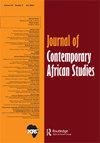非洲转型的知识、行动主义和制度:塔基瓦·马努女权主义研究的主要内容
IF 0.8
Q2 AREA STUDIES
引用次数: 1
摘要
本文考察了Takyiwaa Manuh的学术研究中选择的文本如何处理知识、权力和制度的主题,重点关注它们在非洲转型中的作用。Manuh的奖学金涵盖的范围包括她早期关于如何利用会议人民党的政治权力来促进加纳妇女参与公共事务和非洲统一的研究;她后来的工作是将大学作为知识生产的机构,探讨大学与更广泛社会的关系,以及变革和社会转型的项目;以及她在加纳妇女赋权方面的工作。本文的主要论点是,曼努的女权主义作品强调了知识和行动在追求社会变革中的作用,制度为知识和行动在实践中的结合提供了形式化的可能性条件。此外,虽然Manuh的奖学金是基于加纳妇女生活的现实,但她的工作超越了单一的国家背景,与性别和妇女研究以及非洲研究相关。从她对大陆和跨大陆研究网络的参与中可以看出,Manuh的奖学金邀请我们反思非洲大陆及其他地区知识生产中的地点和背景政治。本文章由计算机程序翻译,如有差异,请以英文原文为准。
Knowledge, activism and institutions for Africa’s transformation: Key strands in Takyiwaa Manuh’s feminist scholarship
This essay examines ways in which selected texts in Takyiwaa Manuh’s scholarship treat the themes of knowledge, power and institutions with a focus on their role in Africa’s transformation. The range of Manuh’s scholarship covered includes her earlier work on how the political power of the Convention People’s Party was used to advance Ghanaian women’s participation in public affairs and African Unity; her later work on universities as institutions of knowledge production, addressing their relations with the wider society and the project of change and social transformation; as well as her work on women’s empowerment in Ghana. The main argument of this essay is that Manuh’s feminist work foregrounds the role of knowledge and action in the pursuit of social change, with institutions providing formalised conditions of possibility for the coalescence of knowledge and action in practice. Moreover, whilst Manuh’s scholarship is grounded in the realities of Ghanaian women’s lives, her work transcends a single national context in its relevance for Gender and Women’s Studies and for African Studies. As evident in her involvement in continental and transcontinental research networks, Manuh’s scholarship invites us to reflect on the politics of place and context in knowledge production for the African continent and beyond.
求助全文
通过发布文献求助,成功后即可免费获取论文全文。
去求助
来源期刊

Journal of Contemporary African Studies
AREA STUDIES-
CiteScore
2.20
自引率
0.00%
发文量
18
期刊介绍:
Journal of Contemporary African Studies (JCAS) is an interdisciplinary journal seeking to promote an African-centred scholarly understanding of societies on the continent and their location within the global political economy. Its scope extends across a wide range of social science and humanities disciplines with topics covered including, but not limited to, culture, development, education, environmental questions, gender, government, labour, land, leadership, political economy politics, social movements, sociology of knowledge and welfare. JCAS welcomes contributions reviewing general trends in the academic literature with a specific focus on debates and developments in Africa as part of a broader aim of contributing towards the development of viable communities of African scholarship. The journal publishes original research articles, book reviews, notes from the field, debates, research reports and occasional review essays. It also publishes special issues and welcomes proposals for new topics. JCAS is published four times a year, in January, April, July and October.
 求助内容:
求助内容: 应助结果提醒方式:
应助结果提醒方式:


